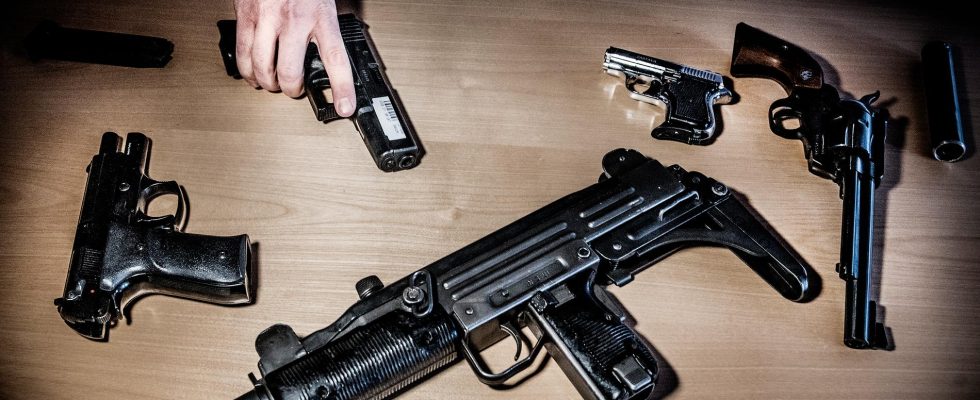Anyone who leaves home with a sharp weapon soon risks not coming home again for at least four years, if the police show up.
– It will be extremely powerful, says Detective Inspector Johan Gustafsson, who, however, worries that the evidentiary requirements may be increased.
The penalty for serious weapons offenses is further tightened. Today, anyone who is sentenced receives at least two years in prison – from the turn of the year at least four years.
The penalty for handling explosive goods is increased to the same extent.
This means that gang criminals who go out with weapons or explosives and are caught by the police can be locked up for twice as long as today.
– There will be a strong mark from society and it is clear that it will have an effect, says Johan Gustafsson, criminal inspector at the National Firearms Center.
Focus more
The minimum sentence for serious weapons offenses was last tightened in 2018, from one to two years, which means that you are in principle always detained.
According to the police, it has hit exactly the right group – gang criminals who are prepared to use the weapons or sell them to others prepared to use them.
– In combination with the fact that the investigations are usually not very comprehensive, we make the assessment that it is a very good tool for curbing gang crime, especially the shootings, says Gustafsson.
In addition to the fact that more people will have to spend longer in prison, more people may be detained.
– There is a high probability that the police and Customs will focus even more on gun crime, both operationally and tactically.
More are sentenced
The tightening in 2018 has led to a sharp increase in the number of people detained for serious weapons offences. From 60–70 people a year before 2018, to between 300–400 today. The figures refer to cases where the weapon crime was the crime that led to the arrest.
The average sentence handed down for serious weapons offenses has also become significantly longer compared to before 2018, according to the government.
Around 60-70 percent of those arrested for serious weapons offenses are convicted, according to police estimates. According to Gustafsson, it is within the normal range for that type of crime.
But even though the aim of the tightening was to reduce the number of illegal weapons in society and prevent deadly violence, shootings remain at a very high level.
Concerns about evidentiary requirements
Can you really say that the tightening had an effect?
– There have been shortcomings. One is that we primarily investigated possession offences. Now, to a greater extent, we also try to look at those who hand over the weapons. We have several cases where we can say that we have cut off the source, which could be a weapons factory in another country, says Gustafsson.
– If we don’t cut off the sources, we will never get rid of the illegal weapons, a change of mindset is required on the part of all law enforcement agencies.
The government writes in the bill that the assessment of serious and particularly serious weapons crimes should be the same as before. But within the police there is a concern that the tougher penalties will lead to higher proof requirements in the courts.
– It is a general concern that more evidence will be required to establish possession or that the weapon was handled in a criminal environment. That you become tougher in the assessments.
Gustafsson says that it is something the police will keep an eye on.
– We will call out if that happens, because in that case it will have the opposite effect.
Deterrent?
The government’s hope is that the doubling of the minimum sentence will also have a deterrent effect. Whether that will be the case remains to be seen, says Gustafsson.
– Research generally says that tougher punishments do not have a deterrent effect, especially not if they are young men who lack consequence thinking. But with regard to gun crime, Brå has said that, at least to some extent, it has a deterrent effect.
Do you see a risk that younger teenagers will be hired to an even greater extent to handle weapons when the punishment is toughened?
– That’s a thought we have to keep with us. But it is already the case that young people get these assignments and I don’t know if there is a risk that it will become even more just because of this. I think there are other factors that make people use young people.
FACT Aggravated gun crime
When is a gun crime considered serious?
1. If the person had the weapon in a public place or where people usually gather, or in a vehicle in such a place.
2. If the weapon has been of a particularly dangerous nature, for example a semi- or fully automatic, with high firepower, or small and easy to hide.
3. If it involves several weapons. By several is meant more than one.
4. If the weapon was held in a criminal environment.
5. If the act has otherwise been of a particularly dangerous nature.
Source: The law, the police
Read moreFACTS Increased penalties for serious weapons offences
On 1 January 2024, the penalty will be increased for:
– aggravated weapons offence
– gross violation of the permit obligation for explosive goods
– gross arms smuggling
– serious smuggling of explosive goods
The penalty scale is increased from imprisonment for 2–5 years to imprisonment for 4–7 years.
Increased penalties for serious weapons crimes is one of the laws that the government wants to speed up. It was originally supposed to come into force on 1 April, which was changed to 1 January after the severe wave of violence in the autumn.
Read more
